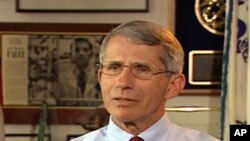Health experts agree that the HIV/AIDS pandemic is still one of the most serious public health crises of our time. But unlike its early days, when there was little information and few resources to deal with it, recent discoveries have led to more effective and affordable prevention and treatment.
For many scientists who studied HIV in the early days, the virus was unlike anything they had ever seen before. Dr. Anthony Fauci was a young physician at the National Institutes of Health. He recalls first reading about HIV cases in a report provided by the Centers for Disease Control. “It was a curiosity; I had never seen anything like that.” The report described an illness of gay men from the Los Angeles, San Francisco and New York City areas who had a strange pneumonia, Pneumocystis pneumonia, usually seen in cancer patients. “That was the beginning of the now 30 years of the AIDS era,” he said.
Many scientists like Fauci were worried about a developing medical problem that he called “mysterious and scary.” With little knowledge about how to respond, they began researching it.
Since then Fauci has devoted his career to the study of infectious diseases. He is now one of the best-known scientists in the world. He has been head of the National Institute of Allergy and Infectious Diseases at the National Institutes of Health for almost three decades and continues to oversee research efforts in infectious diseases such as HIV/AIDS and other sexually transmitted infections.
Early misconceptions
Since many of the first patients were from the gay community, scientists believed it was confined to the gay population. “But very quickly…it became clear that it was not restricted to gay men, that it was injection drug users and contaminated blood transfusions…and heterosexual partners of infected individuals.”
Because of the misconceptions in the early days of researching and treating HIV, government policy makers were not quick to respond. That was because of the stigma attached to gay people in United States at the time: “one of the problems is that it was in a population that is generally disenfranchised; there is a lot of stigma associated with the disease,” Fauci said. But as HIV/AIDS turned into a global pandemic and as it came to be better understood, the scientists and policy makers realized it was predominantly transmitted by heterosexuals, he said.
Also, he added, many governments were somewhat complacent about the disease because they didn’t realize the wider effects it would have on the community. “I don’t think early on…it got the attention that it should have.”
The pandemic would go on to have a greater effect on poorer parts of the world, like sub-Saharan Africa, where millions of people have died of AIDS and millions more live with the disease.
Fauci talked about the progress made by the world community in responding to HIV/AIDS. Scientists isolated the virus. They developed drugs to deal with it. And, he said, "We have had important breakthroughs in the arena of prevention. If you bring down the viral load in people who you are treating, you can decrease the likelihood that they will infect other people."
His own work continues, and he has been recognized for making important contributions to the scientific community’s understanding of how AIDS destroys the body’s defenses, making it susceptible to deadly infections, and for developing therapy for people living HIV/AIDS.










